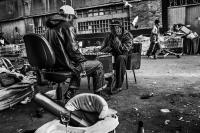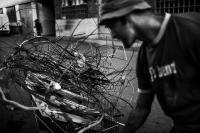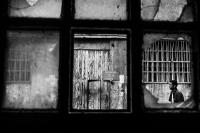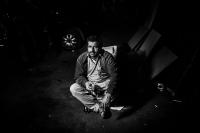November 29, 2012. Mukhtar Ahmed, 41, works 8 hours a day, 7 days a week, looking for scrap metal in garbage containers with which he can earn 5 to 10 euros per day.
January 10, 2103. The collective of people at the industrial warehouse would like to normalize their work situation with scrap metal, create a cooperative, and regularize their resident status.
January 10, 2013. When people arrive at the warehouse with a full shopping cart of scrap, they select and separate material and products.
December 11, 2012. Zabre Omar, 29, born in Burkina Faso, worked as a farmer and photographer in his country. He now works collecting scrap metal which he sells at Ca l'Africa, earning 5 to 10 euros a day.
February 04, 2013. People try to raise awareness about their situation in the warehouse. They’ve already been in the country many years and are giving their lives to this country. They even have children who have been born Catalan. The current situation is not sustainable.
25 June, 2013. Diatta Arouna, from Senegal, works the scrap metal at the warehouse. He has a place where he buys scrap metal that people bring, and also a space where he offers food and drink. Although he does not live in the warehouse, he is one of the leaders and works hard to feed his wife and two children.
July 11, 2013. Different businesses have grown in the warehouse. There is a bike repair shop for example, the main transport used by people who live there.
January 10, 2013. The president of warehouse collective, plays checkers.
November 23, 2012. Axel, from Belgium, collects scrap metal and also works helping to separate appliances that arrive to Ca l'Africa at one of the purchase points.
November 21, 2012. The Pope, from Rumania, is one of the most respected figures in Ca l'Africa. Besides collecting scrap, Romanians also collect paper and cardboard to recycle.
November 15, 2012. All material that enters the warehouse is organized and stored.
June 25, 2013. Diatta Arouna, from Senegal, works the scrap metal at the warehouse and also has a space where he serves plates of chicken and rice for 2 euros.
June 26, 2013. People set up different businesses in order to survive, like a hairdresser.
December 12, 2012. For the past 15 months Ca l'Africa has been in a situation of emergency. It is the largest squatted space in all of Spain and many people depend on it. About 300 different people from many different countries and cultures it coexist peacefully there. Abdul Hafid from Morocco and Mamadou Kheraba from Senegal share a beer at the end of the day.
January 22, 2013. Mamadou Kheraba was born in southern Senegal 43 years ago. It's been almost 14 years since he arrived in Catalonia. He has always lived in Barcelona. He has 36 brothers in different countries around the world. He is expecting a child and he has another 10 year old son who was born here. In Senegal he worked in his family trade of small business and agriculture. Hope is the only thing he cannot loose and he prays every day.
July 23, 2013. In the warehouse, there are at minimum 10 different self sustaining businesses that in turn, provide the economic base for Ca L’Africa. Scrap metal collection, canteens, bars, grocery stores, etc.
November 22, 2012. Mukhtar Ahmed, 41 years, of Pakistani origin had to flee Pakistan because had family problems. He has been living next to Ca l'Africa, five months and collects scrap metal.
January 22, 2013. Spain has 3.4 million empty homes, 10.8% more than in 2001 and over 400,000 evictions forced evictions have been ordered by judges in Spain since the beginning of the crisis in 2008.
July 11, 2013. Ibrahima Seydi from Senegal, rests during the day, surrounded by his artistic works.
November 15, 2012. Mamadou Kheraba one of the founders of Ca l'Africa, rests in the space where he works Up-cycling material (scrap, appliances, machinery, building materials, etc.).
July 03, 2013. John from Senegal is one of the first to arrive at the warehouse two years ago. Now he is responsible for one of the canteens, offering cooked dishes for 2 euros.
pause




























